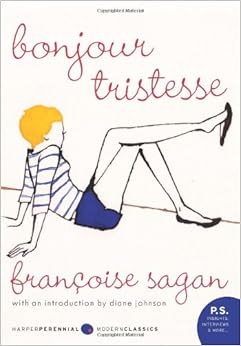“Endearing, self-absorbed, seventeen-year-old Cécile is the very essence of untroubled amorality. Freed from the stifling constraints of boarding school, she joins her father—a handsome, still-young widower with a wandering eye—for a carefree, two-month summer vacation in a beautiful villa outside of Paris with his latest mistress, Elsa. Cécile cherishes the free-spirited moments she and her father share, while plotting her own adventures with a “tall and almost beautiful” law student. But the arrival of her late mother’s best friend, Anne, intrudes upon a young girl’s pleasures. And when a relationship begins to develop between the adults, Cécile and her lover set in motion a plan to keep them apart…with tragic, unexpected consequences.”

Although it translates as ‘Hello Sadness’, Bonjour Tristesse is not exactly a tale of woe, although the ending is tinged with tragedy. As the blurb above details, we join Cécile on her summer holidays by the French Riviera, where she spends her days swimming, sunbathing and rendezvousing with her lover. Perhaps the title is tongue-in-cheek, a nod to teenage angst.
What stood out to me immediately with this book was her inner dialogue; Cécile’s way of thinking. Having such strong yet also conflicting thoughts about a person, opinions so easily swayed, feeling so strongly about something but little flickers of doubt or opposition easily tipping her to the other side. How delicate and juvenile the teenage mind, finding thoughts and learning to deal with feelings and people, being unable to pinpoint why she feels the way she does, and feelings changing without understanding why.
In true teenage fashion, Cécile over-analyses and over-thinks people and situations, causing her thinking to become warped. In her mind, she had convinced herself that Anne was snobbish with a superior attitude, who would wreck havoc on her life and her relationship with her father. The reality was, from an adult perspective, that Anne was looking out for Cécile, in terms of wanting her to get an education – for her own good – with no real indication of seeking to change their lives for the worse; it was all a creation, fabricated in Cécile’s mind.
But Bonjour Tristesse was more than a coming-of-age story… in fact, was it even coming-of-age at all? Cécile’s desire to cling to the lifestyle she had grown accustomed to with her father was childlike, and she seemed to get her way in the end, which left a void. She had not grown or developed, rather she continued to live frivolously and, arguably, emptily, without any sense of direction, something which Anne would have undoubtedly provided and helped, rather than manipulated and changed for the worse. Again linking to teenage themes, Cécile resented Anne for encouraging her to study instead of spending time with her boyfriend, seeing it negatively.
Short at just 132 pages, it’s an ideal read for a lazy weekend. x




Leave a Reply